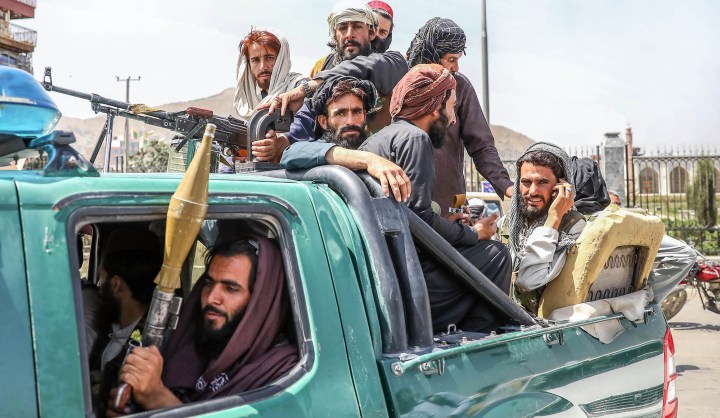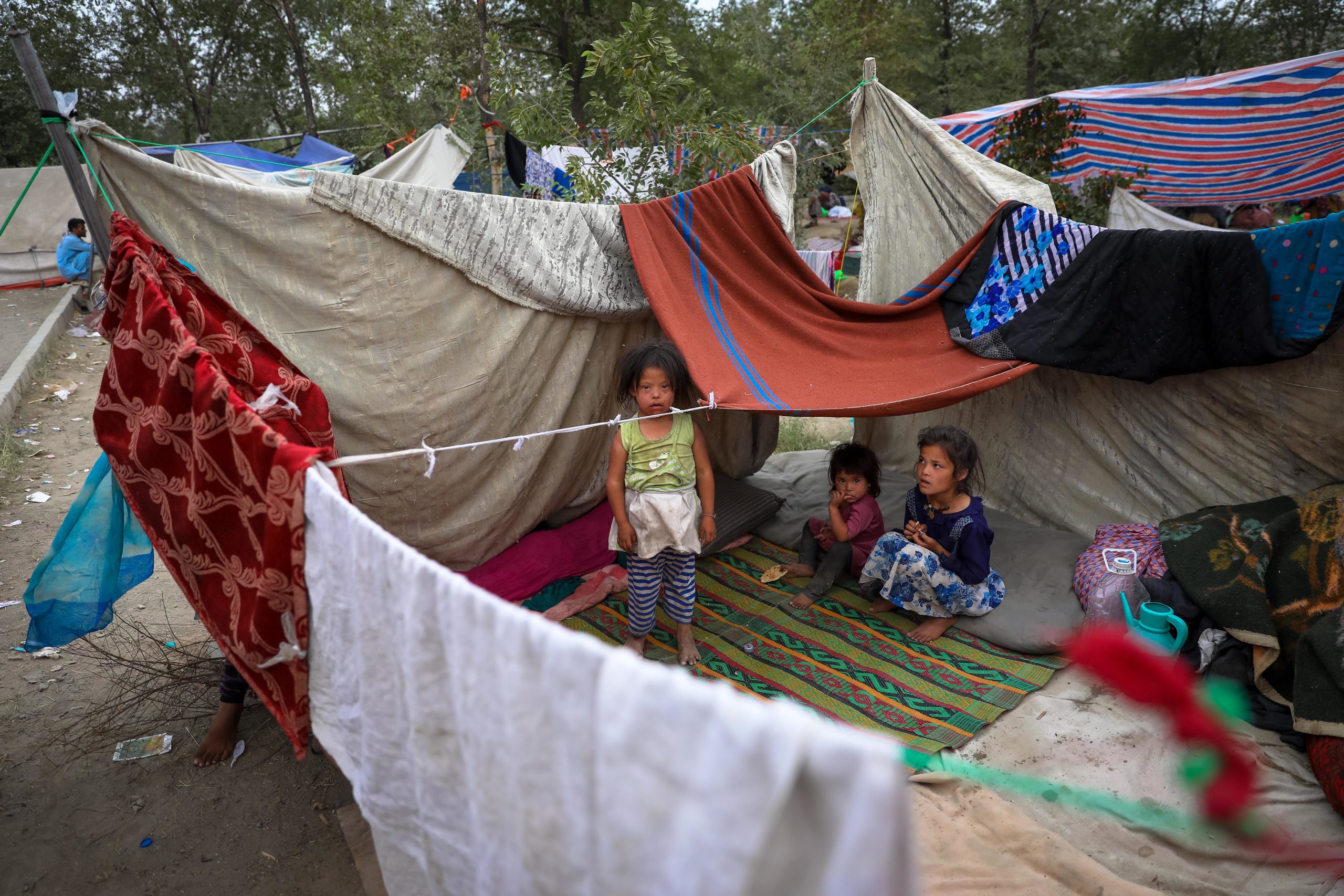US PULLOUT
Explainer: What’s happening in Afghanistan?

Taliban fighters have seized control of Afghanistan, finally taking Kabul on Sunday. Now the internet is awash with videos of people frantically running for planes — but what does it all mean, and will South Africa be affected?
How have the Taliban seized power in Afghanistan?
It is the culmination of a military advance that began in May, when the US started to withdraw its troops. Despite the two decades and more than $80-billion that the US ploughed into attempts to beef up the Afghan military, local troops have offered little resistance in the face of the Taliban onslaught. The US-installed Afghan government has been toppled, with President Ashraf Ghani fleeing the country.
Why did the US decide to withdraw troops at this time?
Because this year sees the twentieth anniversary of the event which provided the original prompt for the US military invasion of Afghanistan: the 9/11 attacks. In April, President Joe Biden announced that all US and Nato troops would be withdrawn from Afghanistan by 11 September 2021.
The rationale for the US mission in Afghanistan was because 9/11 mastermind Osama Bin Laden was sheltered by the Taliban and used Afghanistan as a recruitment site.
But, particularly after Bin Laden was killed on 2 May 2011, the ongoing US presence in Afghanistan has been a thorn in the side of successive American presidents. Polls in 2013 rated it the most unpopular war in US history, surpassing even Vietnam.
When Biden announced the withdrawal of troops in April, he said: “I believed that our presence in Afghanistan should be focused on the reason we went in the first place — to ensure Afghanistan would not be used as a base from which to attack our homeland again. We did that. We accomplished that objective.”
So… does that mean that withdrawing US troops was a terrible decision?
It depends on who you listen to, and what their political affiliation is. US Republicans are now crowing about how Biden has “humiliated America” (Senator Tom Cotton) and how the Biden administration failed to listen to warnings about the chaos that would inevitably accompany the drawdown of troops (Senator Marco Rubio).
But it seems as if a “damned if you do, damned if you don’t” situation has been in play. It has been pointed out, for instance, that the reason why the loss of US soldiers in Afghanistan has been minimal in recent months is only because the US committed to the withdrawal of troops at talks with the Taliban in Doha in 2020.
The US could not keep troops in Afghanistan indefinitely. Apart from the war’s lack of popularity, it has also been hugely expensive, both in financial and human terms. Around 2,300 US troops have lost their lives there; a figure dwarfed by the number of Afghans estimated to have been killed or wounded: at least half a million.
What has the Taliban been doing for the past 20 years?
Since being dethroned from political power in Afghanistan in 2001, the group has not been idle. Many senior figures initially retreated to, and regrouped in, neighbouring Pakistan — where the Taliban was responsible for one of the most high-profile attacks in recent years when its fighters shot schoolgirl Malala Yousafzai in October 2012.
But the Taliban’s footprint in Afghanistan was never lost and grew larger over the years. By 2015 the Taliban had seized control of the city of Kunduz. Today, Nato estimates that the group has more fighters — around 85,000 — in Afghanistan than at any time since 2001.
How do ordinary Afghans feel about the Taliban takeover?
Since the peace deal was signed with the US in February 2020, the Taliban switched targets from foreign troops to Afghan civilians — including “journalists, judges, peace activists, women in positions of power”. The motivation for these assassinations, according to the BBC, was the desire to “eliminate their critics ahead of a return to power, and instil a deep fear in those left alive”.
As such, there has reportedly been an atmosphere of fear brewing in the country long before the fall of Kabul on Sunday. Although foreign troops may have been unpopular, many citizens are said to be terrified of the Taliban and the more restrictive religious regime that the group will install.

Internally displaced families from northern provinces, who fled from their homes due to the fighting between Taliban and Afghan security forces, take shelter in a public park in Kabul on 14 August. (Photo: EPA-EFE / Hedayatullah Amid)
Part of the problem is that, as National Geographic recently reported, younger Afghans belong to “a more permissive, urbane generation that came of age after the fall of the Taliban, with vague to no memory of the oppressive, fundamentalist regime, born in [Kandahar], that banned television, music, and cinema; forbade men from trimming their beards; and forced women to wear head-to-toe burqas”.
The resurgence of the Taliban is particularly bad news for women. In reports akin to extracts from The Handmaid’s Tale, women are said to already have been erased from public signage and advertisements, while others have been instructed not to return to work.
This account by a female student in Kabul is particularly chilling, reporting women being beaten for failing to wear a burqa. She writes: “All I could see around me were the fearful and scared faces of women and ugly faces of men who hate women, who do not like women to get educated, work and have freedom”.
It is already expected that the Taliban’s capture of the country will see an exodus of thousands of refugees and a humanitarian crisis of renewed intensity, worsened by Covid-19. Western powers have committed to providing asylum for Afghans who assisted troops over the past 20 years — and who are likely to face deathly repercussions — but as the footage of people storming the airports suggests, demand for being airlifted out already far exceeds supply.
What kind of a threat does this pose to global security?
The fear is that the return to power of the Taliban will see the revival of other groups, like al-Qaeda, which will use Afghanistan as a base from which to carry out attacks — with the country becoming, as British Prime Minister Boris Johnson put it, “a breeding ground for terror”.
The only countries which have in the past recognised a Taliban-led government have been Pakistan, the United Arab Emirates and Saudi Arabia, but today China also has ties to Taliban leaders — adding another level of complexity to the situation. The United Nations has committed to keeping its offices open in Afghanistan for the time being.
It’s important to note that current events in Afghanistan are not even close to being the fault of ordinary Afghans, with the country having been used as a punching bag by external forces for decades.
As Steve Coll, author of several books on the region, told The New Yorker: “This situation was triggered by an outside invasion, initially by the Soviet Union, during the Cold War, and since then the country has been a battleground for regional and global powers seeking their own security by trying to militarily intervene in Afghanistan, whether it be the United States after 2001, the C.I.A. in the nineteen-eighties, Pakistan through its support first for the mujahideen and later the Taliban, or Iran and its clients”.
What is South Africa’s relationship with Afghanistan?
Afghanistan has no embassy in Pretoria, but as Department of International Relations and Cooperation (Dirco) spokesperson Lunga Ngqengelele stressed to Daily Maverick, this was not evidence of no diplomatic ties between the two countries.
“South Africa is accredited to Afghanistan from the South African High Commission in Islamabad, Pakistan,” Ngqengelele said.
South Africa did not grant recognition to the Taliban regime pre-2001. Dirco has, however, yet to make a formal statement on the events unfolding in Afghanistan. DM



















 Become an Insider
Become an Insider
Comments - Please login in order to comment.